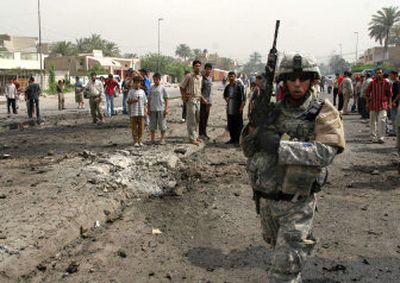Brigade’s Iraq tour on hold

WASHINGTON – The Pentagon announced Monday it has delayed sending 3,500 troops from Germany to Iraq as commanders in Baghdad assess whether security conditions have improved enough to allow more cuts in forces.
The Pentagon said troops with the 2nd Brigade, 1st Infantry Division, based in Schweinfurt, Germany, were scheduled to begin deploying this month, but a decision about whether they would be sent to Iraq has been delayed.
Officials cautioned that the announcement didn’t mean that the brigade’s deployment has been canceled or that an overall reduction in U.S. forces in Iraq would soon follow.
“This is a very narrow decision to hold one brigade from deploying and to give the commanders on the ground additional time to continue their assessments,” said Bryan Whitman, a Pentagon spokesman.
There are about 133,000 American troops in Iraq. Defense officials have suggested that if the political and security situation improves, there could be a significant reduction of forces by year’s end.
“There’s still a marker to get down to 100,000 by Christmas,” said a defense official who asked not to be named because speaking publicly on rotation plans and other operational matters is unauthorized.
The official said decisions regarding the size of forces in Iraq would likely occur at the end of May and in August, since deployments of troops and equipment have to be mapped out months in advance.
Two weeks ago, after months of deadlock, the Iraqi parliament picked Nouri al-Maliki as its prime minister-designate. Al-Maliki must form a Cabinet by May 22 or the new government will dissolve and the process of selecting a prime minister start over.
After al-Maliki was chosen for the post, President Bush suggested that U.S. forces might begin withdrawing soon, saying, as he has in the past, that “as more Iraqi forces stand up, American forces will stand down.”
Last week, Defense Secretary Donald H. Rumsfeld told a radio interviewer that Iraqi soldiers and police number 250,000 and soon will reach 325,000. U.S. troops are handing over more bases, larger chunks of territory and more responsibilities to Iraqi troops, a process that “of course will then enable us to draw down the size of our force,” Rumsfeld said.
Military officials in Washington and in Baghdad say that by the end of summer, more than 75 percent of Iraq will be under the control of the Iraqi army and police.